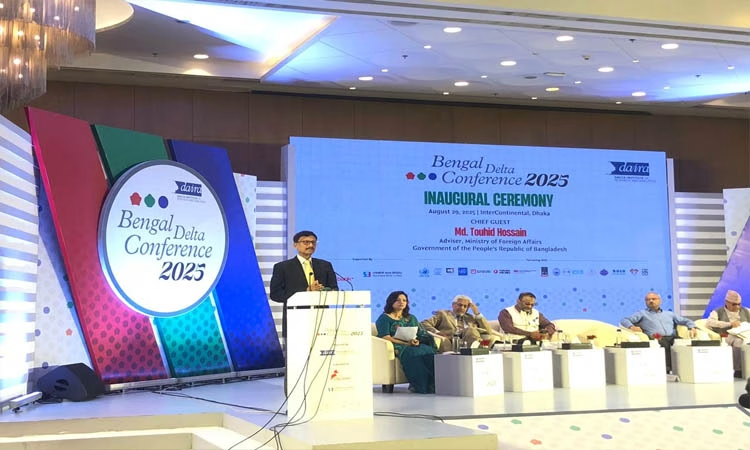Foreign Affairs Adviser Md Touhid Hossain on Friday stated that the youth of Bangladesh, who played a pivotal role in the July-August movement of 2024, will ultimately redefine the nation’s political and institutional framework, steering the country towards a future rooted in knowledge and constructive development.
“Though they may err as they progress, with time and experience, they will foster a stronger and more equitable political culture,” he remarked.
Touhid made these comments during his address as the chief guest at the inaugural session of the Bengal Delta Conference 2025, held in Dhaka. The event, organised by the Dacca Institution of Research and Analytics (DAIRA), brought together policymakers, scholars, and experts to discuss the political, economic, and geopolitical dynamics of South Asia.
Honoring the lives lost during the 2024 movement, he acknowledged that the changes witnessed today were only made possible due to their sacrifices. He expressed hope that the emerging generation would prevent the nation from reverting to the political dysfunction of the past.
Discussing global politics, Touhid highlighted three major issues: the ongoing war in Ukraine, the genocide in Gaza, and escalating US-China tensions. He noted that US public opinion was shifting, with increasing support for the Palestinian cause, including criticism of Israeli actions from within Jewish intellectual circles.
Regarding South Asia, the adviser mentioned that US-India relations, once primarily focused on countering China, were now undergoing a recalibration. However, he warned against assuming any permanent shifts, pointing out that “the geopolitical fundamentals remain unchanged.”
Touhid emphasized that the 21st century would be shaped by Asia’s rise, while Africa’s potential would unfold in the 22nd century, contingent on the continent’s ability to leverage its demographic advantages and resources.
Turning to the Rohingya crisis, which has now persisted for eight years, he warned that the issue was escalating from a national challenge to a regional threat. With nearly a million young refugees, Touhid cautioned that they could not be contained in camps indefinitely. “It is unrealistic to believe they will accept a life of hopelessness forever. If left unresolved, this crisis will spill beyond Bangladesh and become a serious regional and global problem,” he asserted.
On domestic matters, Touhid criticized what he referred to as “educational apartheid,” highlighting that while a privileged few had access to world-class education, most children, particularly in rural areas, lacked access to even basic quality schooling. “Around 30 per cent of students finishing primary school cannot even read Bangla properly, let alone English,” he said.
He called for reforms in higher education, suggesting that Dhaka University should focus more on research, with fewer students but stronger outcomes in fields such as science and economics.
“The political culture needs to evolve. Political parties should strive for power, but power should be used to strengthen institutions, expand knowledge, and secure a better future for the youth—so they are not compelled to seek perilous migration routes,” Touhid concluded.
The conference saw participation from distinguished figures such as former Malaysian Education Minister Prof Maszlee bin Malik, former Nepalese Water Resources Minister Dr Dipaik Gyawali, Dhaka University Vice Chancellor Prof Niaz Ahmed Khan, founding editor of The Wire Siddharth Varadarajan, and Daily Star Editor Mahfuz Anam. Economics professor Dr Mushtaq Khan from SOAS University, London, delivered the keynote address.
The three-day event included sessions focused on governance, sustainable development, and the vital role of youth in fostering inclusive politics amid climate change, shifting geopolitical alignments, and economic challenges.


